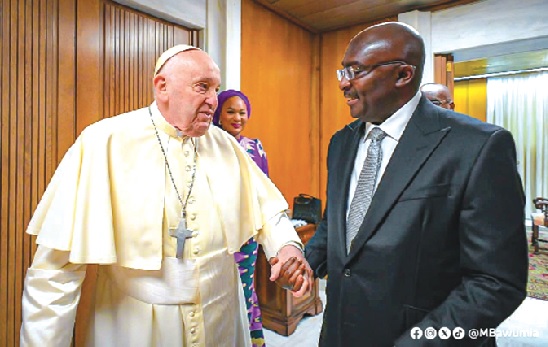
Church and government in Ghana: Learning from Kenya?
RECENT events in Kenya, involving mass protests against proposed tax increases, have led to tragedy. Over 50 people were killed in recent demonstrations.
More than 400 people were injured, around 700 arbitrarily detained, and over 60 abducted or missing in connection with the protests.
In response, the government rescinded the proposed tax rises. The climb-down was not enough to quell protestors’ anger. Many are young people who find themselves in a perilous position, with little prospect of employment, even when they have been to university and have graduated with qualifications.
A recent front page of the Daily Graphic (16 July) cited Ghana Statistical Service (GSS) data that 1.9 million youths in Ghana, that is nearly six per cent of the country’s 35 million people, are not in education, employment or training (NEET).
Youth unemployment
In both Kenya and Ghana, youth unemployment is a ticking time bomb. Those in power should urgently note the problem, and make renewed efforts to ameliorate the situation. The youth are the future and to ignore their plight is both morally wrong and politically foolhardy.
Who do the youth blame for their situation? In Kenya, youth protests against planned tax increases have not only targeted the government.
They have also served as a wake-up call for the Church, a powerful institution. Kenya, like Ghana, is a Christian-majority country where more than 80 per cent of the population, including the president, are Christian.
According to the 2021 government census, approximately 71 per cent of Ghana’s population is Christian, 20 per cent Muslim, three per cent adhere to indigenous or animistic religious beliefs, and six per cent belong to other religious groups or have no religious beliefs
Why did the Kenyan demonstrators turn against the Church? Protesters not only accused Church leaders of siding with the government, but also expressed resentment at the fact that politicians often use the pulpit as a political platform.
Kenya’s protesters condemn what they see as a cosy relationship between Christian and political institutions, including visits by Church leaders to the State House, the presidential residence, including during recent protests.
A protest leader, Meshack Mwendwa, stated that: ‘We believe the president is buying the Church’. The protestors demand an end to the regular practice of ‘harambee’, that is, politicians giving large sums of money to the Church.
Such donations are said to buy political influence on Sunday mornings. The protest movement aims to stop that – they call it #OccupyChurch.
Angry demonstrators
One of Ghana’s most senior theologians recently told me that he was ‘confronted by #OccupyJubilee House protesters in traffic because [he] was in clerical collar.
When the anger reaches a certain point, the church will be in real trouble’. He explained to me that the anger of the demonstrators towards him was not because he was recognised as one of the elite; rather, it was because ‘the church is seen as not being “prophetic” enough when it comes [to] power and corruption’.
He added: ‘Unfortunately people identify the high-profile pastors with political parties’.
I am not suggesting that the political situation in Ghana is as volatile and as destabilising as that currently in Kenya. Ghana has a long tradition of political tolerance and while there is periodic violence at election times involving hotheads of various party persuasions, generally stability quickly returns; in short, democracy is respected and triumphs at election times.
Nevertheless, youth unemployment is a major political problem in Ghana, and has been for many years.
Yet, as the GSS recently reported, youth unemployment is becoming more pronounced and seemingly intractable, with NEET on the increase.
The situation has worsened in recent decades, as Ghana has opened up its economy to global competition. Over the last few decades, in addition, corruption is said to have expanded greatly, both in relation to the range of people involved and to the sums being diverted into private hands from state resources.
The current situation in Kenya reveals that young people are protesting against what they see as intolerable existential conditions.
Many regard the Church and government in cahoots, each benefiting from prevailing conditions. Consequently, many young people feel they are denied a proper start to adult life, including the opportunity to marry and have a family because of their poor financial position and employment prospects.
Church/state
In Ghana, while the Church provides employment opportunities, including to the youth, it is not adequate given its potential.
To improve youth unemployment, the Church could work more closely with government to create jobs and engage in skills development to improve the chances of their young members to get jobs.
Many Ghanaians, not only among the young, see a close relationship between Church and government. For many pastors, it is an extension of prosperity thinking to be seen in high profile political company; there are pecuniary and other advantages too. Many pastors, it is said, travel on diplomatic passports.
If the recent events in Kenya are anything to go by, then it is not a good idea for there to be ‘too close’ relations between Church and government, even in a Christian-majority country such as Ghana. When people begin to see the
Church as part of the problem and not the solution then the Church begins to lose its authority and people look elsewhere for their spiritual succour.
The writer is an Emeritus Professor of Politics, London Metropolitan University, UK
